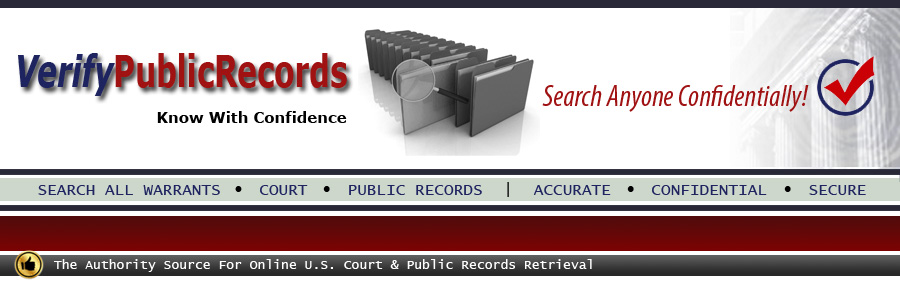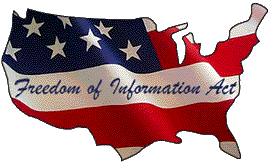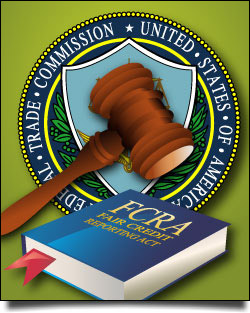

Right To Know
Freedom of Information Act
The Freedom of Information Act, also known as FOIA, was enacted in 1966 and adopted to create and maintain a transparent government by giving citizens the right to public information held by the United States federal government. It allows for the full or partial disclosure of information to keep citizens in the know and gives any person access to federal agency records. Under the FOIA, agencies are required to disclose any information that is sought, except those records or portions of them which are protected from public disclosure by one of nine exemptions.
The nine current exemptions to the FOIA are listed below:
1. (A) Specifically authorized under criteria established by an Executive order to be kept secret in the interest of national defense or foreign policy and (B) are in fact properly classified pursuant to such Executive order.
2. Related solely to the internal personnel rules and practices of an agency.
3. Specifically exempted from disclosure by statute (other than section 552b), provided that such statute (A) requires that the matters be withheld from the public in such a manner as to leave no discretion on the issue, or (B) establishes particular criteria for withholding or refers to particular types of matters to be withheld; FOIA Exemption 3 Statutes.
4. Trade secrets and commercial or financial information obtained from a person and privileged or confidential.
5. Inter-agency or intra-agency memoranda or letters which would not be available by law to a party other than an agency in litigation with the agency.
6. Personnel, medical files and similar files, which the disclosure of this information would constitute a clearly unwarranted invasion of personal privacy.
7. Records or information compiled for law enforcement purposes, but only to the extent that the production of such law enforcement records or information (A) could reasonably be expected to interfere with enforcement proceedings, (B) would deprive a person of a right to a fair trial or an impartial adjudication, (C) could reasonably be expected to constitute an unwarranted invasion of personal privacy, (D) could reasonably be expected to disclose the identity of a confidential source, including a state, local, or foreign agency or authority or any private institution which furnished information on a confidential basis, and, in the case of a record or information compiled by a criminal law enforcement authority in the course of a criminal investigation or by an agency conducting a lawful national security intelligence investigation, information furnished by a confidential source, (E) would disclose techniques and procedures for law enforcement investigations or prosecutions, or would disclose guidelines for law enforcement investigations or prosecutions if such disclosure could reasonably be expected to risk circumvention of the law, or (F) could reasonably be expected to endanger the life or physical safety of any individual.
8. Contained in or related to examination, operating, or condition reports prepared by, on behalf of, or for the use of an agency responsible for the regulation or supervision of financial institutions.
9. Geological and geophysical information and data, including maps concerning wells.
Fair Credit Reporting Act
The Fair Credit Reporting Act (FCRA) is a United States federal law passed in 1970, that regulates how consumer credit information can be collected, given out, and treated. It's enforced and governed by the U. S. Federal Trade Commission and allows the public access to view information in their credit history and dispute inaccurate information that may be on file.
Consumer reporting agencies (CRAs) are responsible for collecting information about consumers for credit evaluations and other financial purposes. A credit bureau is considered a type of CRA since it keeps a database of consumer credit reports. It's the job of consumer reporting agencies to provide a consumer with such information and to verify the accuracy of information that a consumer disputes as false. Under the Fair and Accurate Credit Transactions Act (FACTA), an amendment to the FCRA passed in 2003, consumers are allowed one free credit report per calendar year. To obtain your free report you can inquire by phone, mail, or at annualcreditreport.com.
The FCRA dictates how long damaging information may stay on a consumer's credit report, such as late payments, bankruptcies, tax liens or judgments. Typically, negative reports will stay on a person's record for 7 years from the date of the delinquency. The exception to this is bankruptcies which remain for 10 years and tax liens which remain on record for 7 years from the time they are paid in full. If false information is removed as a result of a consumer's dispute, it may not be put back on the person's record without notifying the consumer in writing within five days.
Freedom of Information Act
The Freedom of Information Act, also known as FOIA, was enacted in 1966 and adopted to create and maintain a transparent government by giving citizens the right to public information held by the United States federal government. It allows for the full or partial disclosure of information to keep citizens in the know and gives any person access to federal agency records. Under the FOIA, agencies are required to disclose any information that is sought, except those records or portions of them which are protected from public disclosure by one of nine exemptions.
The nine current exemptions to the FOIA are listed below:
1. (A) Specifically authorized under criteria established by an Executive order to be kept secret in the interest of national defense or foreign policy and (B) are in fact properly classified pursuant to such Executive order.
2. Related solely to the internal personnel rules and practices of an agency.
3. Specifically exempted from disclosure by statute (other than section 552b), provided that such statute (A) requires that the matters be withheld from the public in such a manner as to leave no discretion on the issue, or (B) establishes particular criteria for withholding or refers to particular types of matters to be withheld; FOIA Exemption 3 Statutes.
4. Trade secrets and commercial or financial information obtained from a person and privileged or confidential.
5. Inter-agency or intra-agency memoranda or letters which would not be available by law to a party other than an agency in litigation with the agency.
6. Personnel, medical files and similar files, which the disclosure of this information would constitute a clearly unwarranted invasion of personal privacy.
7. Records or information compiled for law enforcement purposes, but only to the extent that the production of such law enforcement records or information (A) could reasonably be expected to interfere with enforcement proceedings, (B) would deprive a person of a right to a fair trial or an impartial adjudication, (C) could reasonably be expected to constitute an unwarranted invasion of personal privacy, (D) could reasonably be expected to disclose the identity of a confidential source, including a state, local, or foreign agency or authority or any private institution which furnished information on a confidential basis, and, in the case of a record or information compiled by a criminal law enforcement authority in the course of a criminal investigation or by an agency conducting a lawful national security intelligence investigation, information furnished by a confidential source, (E) would disclose techniques and procedures for law enforcement investigations or prosecutions, or would disclose guidelines for law enforcement investigations or prosecutions if such disclosure could reasonably be expected to risk circumvention of the law, or (F) could reasonably be expected to endanger the life or physical safety of any individual.
8. Contained in or related to examination, operating, or condition reports prepared by, on behalf of, or for the use of an agency responsible for the regulation or supervision of financial institutions.
9. Geological and geophysical information and data, including maps concerning wells.
Fair Credit Reporting Act
The Fair Credit Reporting Act (FCRA) is a United States federal law passed in 1970, that regulates how consumer credit information can be collected, given out, and treated. It's enforced and governed by the U. S. Federal Trade Commission and allows the public access to view information in their credit history and dispute inaccurate information that may be on file.
Consumer reporting agencies (CRAs) are responsible for collecting information about consumers for credit evaluations and other financial purposes. A credit bureau is considered a type of CRA since it keeps a database of consumer credit reports. It's the job of consumer reporting agencies to provide a consumer with such information and to verify the accuracy of information that a consumer disputes as false. Under the Fair and Accurate Credit Transactions Act (FACTA), an amendment to the FCRA passed in 2003, consumers are allowed one free credit report per calendar year. To obtain your free report you can inquire by phone, mail, or at annualcreditreport.com.
The FCRA dictates how long damaging information may stay on a consumer's credit report, such as late payments, bankruptcies, tax liens or judgments. Typically, negative reports will stay on a person's record for 7 years from the date of the delinquency. The exception to this is bankruptcies which remain for 10 years and tax liens which remain on record for 7 years from the time they are paid in full. If false information is removed as a result of a consumer's dispute, it may not be put back on the person's record without notifying the consumer in writing within five days.
ęCopyright VerifyPublicRecords.com_LLC. All Rights Reserved. VerifyPublicRecords.com is not affiliated in anyway with any Federal or State government agencies. All trademarks on this website, whether registered or not, are the property of their respective owners. Please do your own due diligence to determine if the content is right for your individual purposes. The publisher, vendors and advertisers of this site are not liable for any damages or losses associated with its content or the information posted by the publisher, advertisers and vendors. If you have any questions related to this website, please send an email to support@verifyrecords.com and we will reply within 24 hours. Thank you for visiting VerifyPublicRecords.com.
DISCLAIMER: This report is not legal advice. You need to do your own due diligence to determine if the content is right for your Individual purposes. The publisher of this report is not liable for any damages or losses associated with the content in this report.
DISCLAIMER: This report is not legal advice. You need to do your own due diligence to determine if the content is right for your Individual purposes. The publisher of this report is not liable for any damages or losses associated with the content in this report.


Find out more about FOI requests at:
United States Department of Justice
FOIA website
FOIA frequently asked questions
FOIA on wikipedia
United States Department of Justice
FOIA website
FOIA frequently asked questions
FOIA on wikipedia

Fair Credit Reporting Act Links
Fair Credit Reporting Act pdf
About the Federal Trade Commission
Fair Credit Reporting Act on wikipedia
Fair Credit Reporting Act pdf
About the Federal Trade Commission
Fair Credit Reporting Act on wikipedia

